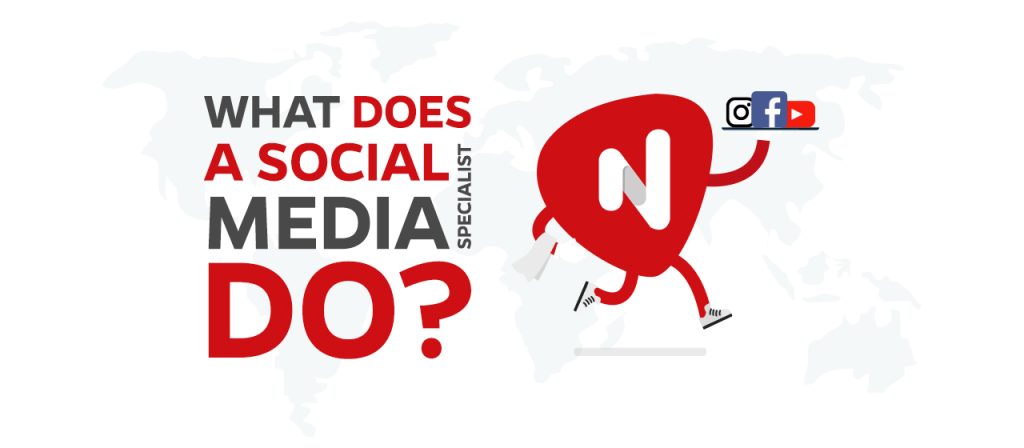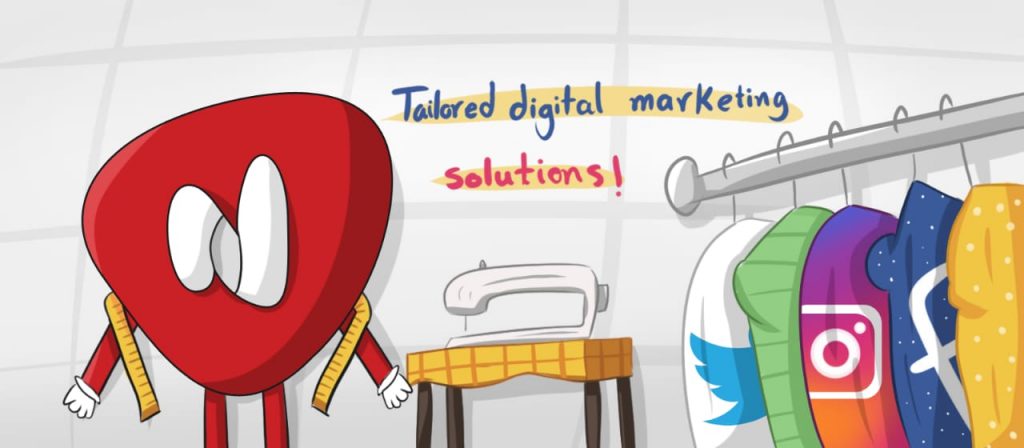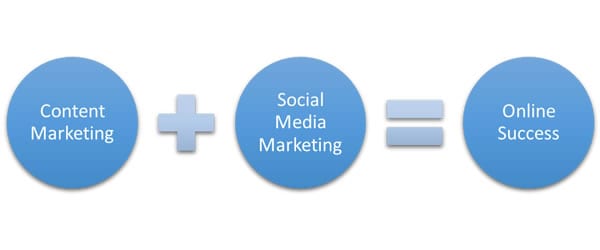One of the main reasons you should use social media marketing is to increase your website traffic. This is not something theoretical but if used correctly social media can become a great source of traffic that can help you establish a successful online business or blog.
When talking about ways you can get more traffic, it’s always useful to show some real examples so as to convince the reader that the proposed methods work and it is not just another myth but something that actually delivers real results.
Of course, to get to a point that you can showcase your success with social media marketing, you need to work hard and consistently over a period of time while at the same time using the correct approach and tools.
Let’s see below an example from a client website that gets a decent amount of monthly traffic from social media. For confidentiality purposes, I cannot publish the website URL but I can show you screenshots from my analytics account. The main takeaway is that social media marketing does work and it can generate a lot of traffic.
[Tweet “15 ways social media marketing can drive traffic to a website #socialmedia #marketing”]
Example: Personal blog on healthy living (period January – February 2015)
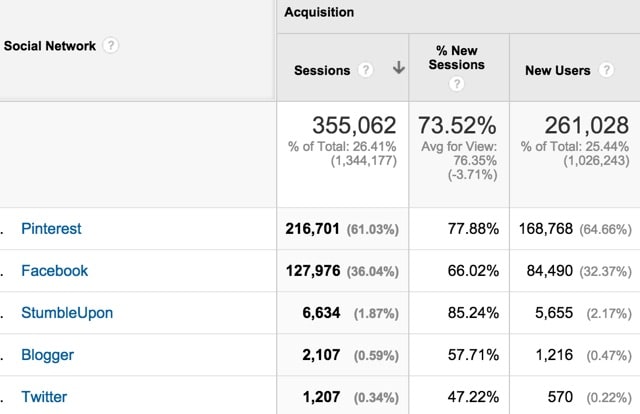
15 Ways Social Media Marketing can Drive Traffic to a Website
When running a social media campaign with the intention of driving more traffic to your website, you can use the following ways to make it more effective.
#1 – Add your website’s URL to your social media profiles
Make sure that on all your social media profiles you have a link pointing to your website. It may sound obvious but there are cases that this is ignored. Adding a link is not only good for SEO purposes but it’s also good for getting more traffic.
#2 – Use #hashtags effectively
Hashtags can generate more exposure for your social media postings. Take a look at some of the best practices on using hashtags and make sure that you use them correctly.
#3 – Utilize social media advertising
The number of social media pages and users is increasing on a daily basis and while this is good because there are more potential users that will view your postings, it also makes it harder to get your posts in front of your followers.
An active social media user will most probably follow a dozen pages and hundreds of people but the timeline can only show a limited number of posts.
Getting organic visibility for your postings (especially if you post as a business) it’s getting more difficult. Facebook have many times changed their algorithm and they only show your posts to a fraction of your followers so the only way to get your message in your follower’s timeline is to utilize Facebook advertising.
This does imply a cost but it is an effective way to target the right audience and get even better results than organic. In addition, everything is tracked by Facebook and you can use the data to further improve your advertising campaigns.
The same applies to Twitter and Linkedin, you can use promoted tweets or Linkedin ads to connect with your followers.
#4 – Make it easy for users to share your content
When visitors read something on your website that they really like, they may want to share it with their friends or social media followers. Thus you should make it really easy to do that by having properly configured social media buttons on your website or blog.
A common mistake that many people do is adding social media buttons but not checking that the content is shared correctly. When you click to share a post, the title, description, and image should be well formatted otherwise users will not spend time to fix things before they click the share button.
#5- Use images with your posts
Images, videos and other visual items (infographics, illustrations) are more shareable. For you, this means two things. The first thing you should ensure is to have images within your content so that when shared the image goes with the posting and second when doing postings on your social media pages to include images as well. All networks (including Twitter) allow you to add images to your updates so make sure that you take advantage of this.
#6 – Add links to your social media postings
Besides adding links to your social media profiles, you also need to add links to your social media postings. A good posting has an attractive title, a short description, an image and a link to the original source. See an example from my facebook page:
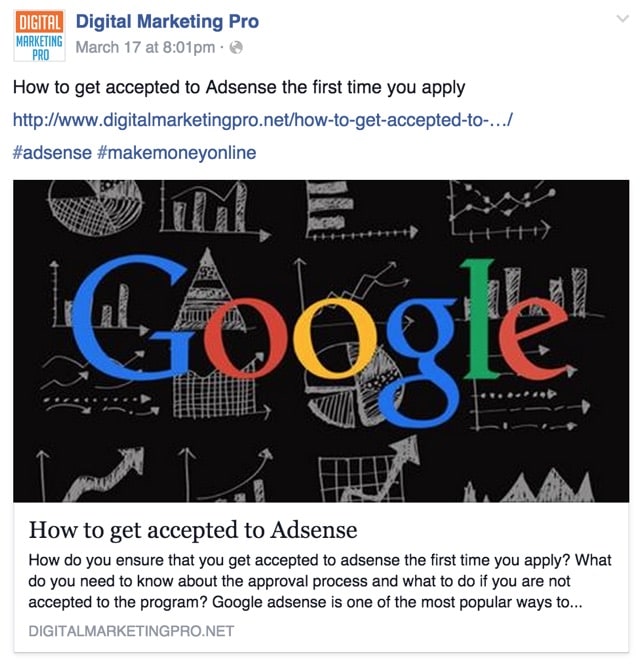
#7 – Post regularly
You don’t want to spam your followers with a lot of daily postings but making regular updates will get more exposure and traffic. According to statistics the recommended number of postings per day per social network are:
- Pinterest: 5 postings
- Twitter: 3 postings
- Facebook: 2 postings
- Google+: 3 postings
- Instagram: 2 postings
#8 – Don’t over-promote your products or company
When posting on your business pages don’t always post about your product or services. Your followers may get bored reading all the time about the benefits of your company, instead, try to make your posts interesting and useful for them. Your first goal is to retain your followers and then to make them convert.
If for example, you plan to make 5 postings per week, try to do 4 posts that are useful and interesting but still related to your products and post only once about your offers or benefits.
# 9 – Create a blog and publish evergreen content
Reading the above tips, you can easily conclude that social media success depends on content. To be able to post on Facebook 2 times per day, you need to have a lot of good content you can share.
One of the solutions is to use content from other websites (by linking to them not stealing their content) but this will drive traffic to their website and not yours and this is a problem.
To get traffic to your website you need to share content from your site and the best way to do that is to create a blog and publish high-quality evergreen content. Evergreen content is always relevant and a great raw material to fetch social media machines.
#10 – Connect with industry influencers
Spend some time and find people/pages that are considered to be the social media influencers in your industry. These are usually the accounts that have a lot of followers and engagement with their postings.
Although the chances of getting followed by them are minimum (until you grow a decent social media profile), it’s good to know what they are doing, sharing, commenting and generally what is trending in your industry.
Re-sharing their content, mentioning and commenting on their postings is a good way to get noticed and establish trust with them.
#11 – Don’t just post content but manage your social media accounts
Posting content alone will not get you far with social media. Even if you publish fantastic posts nobody will see them until you have enough followers in your social media accounts or unless you use advertising.
How do you get more followers? By managing your accounts. In other words by reaching out and connecting with people that have the profile of your potential customer or reader. It’s a time-consuming process because you need to keep track of who to follow, who followed you back and who did not so as to remove them and start all over again.
#12 – Spy your competitors
Although the word spy is not the best to use in this case, it would be nice if you take a look at your close competitors and see what they are doing in social media. How often do they post, what kind of content, what is their following, growth rate, etc? You may get a few ideas to use in your social media campaigns as well.
#13 – Measure results
Use Google Analytics to measure how many visits you get from social media. You can find the report under ACQUISITION / ALL TRAFFIC / CHANNELS. Keep a record of the number of visitors from each social network per month and analyze which network works best for your business or blog and spend more time on that.
Besides Google analytics you can also use statistical data from Facebook, Twitter, Pinterest and from the tool you are using to schedule/publish your posts in the social networks.
#14- Reply to comments or mentions
Monitor your social media accounts and reply to comments, mentions of your brand. Showing to users that you are active in social media encourages more engagement. For example, if someone retweeted one of your tweets, send them a thank you message or if you get a comment on your FB post – reply to the comment answering their question or thanking them for the comment.
#15 – Create a social media strategy
All the above tips are part of your overall social media marketing strategy. A successful strategy should also include details about your social media goals, target audience, content marketing plan and other ways to correctly measure the ROI from your social media efforts.
Conclusion
Social media marketing can bring traffic to a website and like any other online marketing technique, it is a process that needs a lot of effort, time and hard work. Social media is not supposed to replace SEO but they can both work together in harmony by supporting each other’s methods.


